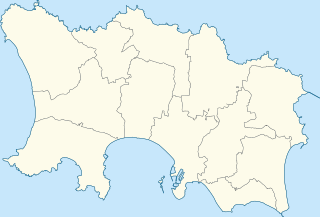Related Research Articles
A sheriff is a government official, with varying duties, existing in some countries with historical ties to England where the office originated. There is an analogous, although independently developed, office in Iceland that is commonly translated to English as sherif.
A constable is a person holding a particular office, most commonly in criminal law enforcement. The office of constable can vary significantly in different jurisdictions. A constable is commonly the rank of an officer within the police. Other people may be granted powers of a constable without holding this title.

A bailiff is a manager, overseer or custodian – a legal officer to whom some degree of authority or jurisdiction is given. Bailiffs are of various kinds and their offices and duties vary greatly.

Hungerford is a historic market town and civil parish in Berkshire, England, 8 miles (13 km) west of Newbury, 9 miles (14 km) east of Marlborough, 27 miles (43 km) north-east of Salisbury and 60 miles (97 km) west of London. The Kennet and Avon Canal passes through the town alongside the River Dun, a major tributary of the River Kennet. The confluence with the Kennet is to the north of the centre whence canal and river both continue east. Amenities include schools, shops, cafés, restaurants, and facilities for the main national sports. Hungerford railway station is a minor stop on the Reading to Taunton Line.
A hundred is an administrative division that is geographically part of a larger region. It was formerly used in England, Wales, some parts of the United States, Denmark, Southern Schleswig, Sweden, Finland, Norway, the Bishopric of Ösel–Wiek, Curonia, the Ukrainian state of the Cossack Hetmanate and in Cumberland County in the British Colony of New South Wales. It is still used in other places, including in Australia.
In England, a township is a local division or district of a large parish containing a village or small town usually having its own church. A township may or may not be coterminous with a chapelry, manor, or any other minor area of local administration.
Frankpledge was a system of joint suretyship common in England throughout the Early Middle Ages and High Middle Ages. The essential characteristic was the compulsory sharing of responsibility among persons connected in tithings. This unit, under a leader known as the chief-pledge or tithing-man, was then responsible for producing any man of that tithing suspected of a crime. If the man did not appear, the entire group could be fined.
The court leet was a historical court baron of England and Wales and Ireland that exercised the "view of frankpledge" and its attendant police jurisdiction, which was normally restricted to the hundred courts.

In Anglo-Saxon England, the reeve was a senior official with local responsibilities under the Crown, such as the chief magistrate of a town or district. After the Norman Conquest, it was an office held by a man of lower rank, appointed as manager of a manor and overseer of the peasants. In this later role, historian H. R. Loyn observes, "he is the earliest English specialist in estate management."

A dean, in an ecclesiastical context, is a cleric holding certain positions of authority within a religious hierarchy. The title is used mainly in the Catholic Church, the Anglican Communion, and many Lutheran denominations. A dean's assistant is called a sub-dean.

The parishes of Jersey are the civil and religious administrative districts of Jersey in the Channel Islands. All have access to the sea and share a name with their ancient parish churches. The parishes and roles within them are based on ancient Jersey law, drawing from the Norman customary law system. As such, many of the parish roles and structures have often been ill-defined.
Vill is a term used in English, Welsh and Irish history to describe a basic rural land unit, roughly comparable to that of a parish, manor, village or tithing.
A tithing or tything was a historic English legal, administrative or territorial unit, originally ten hides. Tithings later came to be seen as subdivisions of a manor or civil parish. The tithing's leader or spokesman was known as a tithingman.

In the Roman Catholic Church and the Anglican Communion as well as some Lutheran denominations, a rural dean is a member of clergy who presides over a "rural deanery" ; "ruridecanal" is the corresponding adjective. In some Church of England dioceses rural deans have been formally renamed as area deans.
A deanery is an ecclesiastical entity in the Roman Catholic Church, the Eastern Orthodox Church, the Anglican Communion, the Evangelical Church in Germany, and the Church of Norway. A deanery is either the jurisdiction or residence of a dean.

A Shire court, or moot was an Anglo-Saxon government institution, used to maintain law and order at a local level, and perform various administrative functions, including the collection of taxes for the central government.

There is an Honorary Police force in each of the twelve parishes of Jersey. Members of the Honorary Police are elected by the voters of the parish in which they serve, and are unpaid.
A parish constable, also known as a petty constable, was a law enforcement officer, usually unpaid and part-time, serving a parish. The position evolved from the ancient chief pledge of a tithing and takes its name from the office of constable with which it was originally unconnected.
The Hundred of Taunton Deane was one of the 40 historical Hundreds in the ancient county of Somerset, England, dating from before the Norman conquest during the Anglo-Saxon era although exact dates are unknown. Each hundred had a 'fyrd', which acted as the local defence force and a court which was responsible for the maintenance of the frankpledge system. They also formed a unit for the collection of taxes. The role of the hundred court was described in the Dooms (laws) of King Edgar. The name of the hundred was normally that of its meeting-place.
A rector is, in an ecclesiastical sense, a cleric who functions as an administrative leader in some Christian denominations. In contrast, a vicar is also a cleric but functions as an assistant and representative of an administrative leader.
References
- White, Archer M. (1895). Outlines of Legal History. London: Swan Sonneschein & Co.
 This article incorporates text from a publication now in the public domain : Chambers, Ephraim, ed. (1728). "Borough-Head, or Headborough". Cyclopædia, or an Universal Dictionary of Arts and Sciences (1st ed.). James and John Knapton, et al.
This article incorporates text from a publication now in the public domain : Chambers, Ephraim, ed. (1728). "Borough-Head, or Headborough". Cyclopædia, or an Universal Dictionary of Arts and Sciences (1st ed.). James and John Knapton, et al.- Bouvier's Law Dictionary. Revised 6th Ed. 1856.